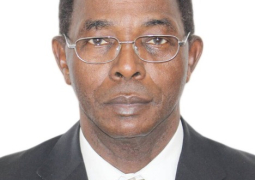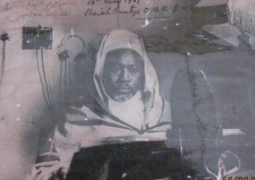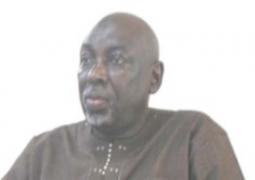Introduction
As people develop through the ages and the quest for knowledge continues to become a significant part of their development, the need to preserve and share knowledge continues to become more important. The invention of paper in Asia will mark a significant beginning in storing and preserving information through the ages.
As soon as these collections and ever-growing materials needed to be housed, the library was created for the purpose. Libraries were created several centuries before the birth of Jesus Christ. Some of these began as modest and personal libraries; as the years went by, others were constructed for public lending. In The Gambia, library services started very late indeed.
The importance of libraries cannot be overemphasised in the development of any nation. For The Gambia to effectively improve on quality education, in-depth research and knowledge production, improving the main national library's standards and promoting knowledge creation through libraries in the regions and schools should be fundamental in the quest for quality education.
Therefore, This paper, which is not entirely complete, aims first to give an overview of the history and development of libraries in The Gambia, then provide details of library services at national and local levels and a picture of the difficulties and constraints faced in library development. It will conclude by sharing the challenges and recommendations.
History
Library services were recorded in 1944, a little before the end of the Second World War, when Bishop Daly of the Anglican mission opened a subscription library in Bathurst. This modest effort included a reading room and could sustain itself for five years before it closed in 1949.
A little before Bishop Daly’s library ceased to exist, the British Council came to The Gambia to promote British culture through books and other resource materials. They put up a library as soon as they arrived and called it the British Council Library. It began with an attractive stock of materials.
The library was housed in a converted bungalow, ideally located in the city centre and had an initial stock of 4000 books which reached a peak of 17,000 but dropped to about 16,000 by the time of the Council's withdrawal from the country in 1962.
The British Council Library will register success in terms of membership registration, particularly with the children. This could be explained in several ways; children were more interested in learning and discovering. Considering the limited materials available in the mid-nineties, the British Council Library was a blessing. Another explanation for its success could also be attributed to the taste to discover, especially with the adults who, after completing their education in foreign countries where access to books was readily available, found nowhere in The Gambia to access reading materials. The British Council became a library centre and a meeting place for socialising. One strange but understandable phenomenon worth noting was the deposit for borrowing books. Subscribers were only to pay a deposit which, the British Council later realised, served more as savings than the purpose it was meant to serve. An enrolment fee was eventually introduced in addition to the deposit. The British Council gradually expanded beyond the library services and provided other intellectual activities and entertainment such as essay competitions, debates, lectures, and film shows. As for the readership, Mr Mbye wrote, “During the period 1946-1962, the adult readership varied between 266 and 589 annually, while that of juniors fluctuated between 104 and 475”. This statement, therefore, attests to the rapid growth of the readership up to close to the year The Gambia gained its independence.
By 1962, the British Council had already trained Gambians as professional librarians. They handed over the library in 1962 to the government. They signed an agreement to continue providing books, periodicals, and newspapers whiles the government built and maintained both the human and material resources. As the Ministry of Education, under which the library management was placed, had other more pressing concerns than sustaining and maintaining the library, the state of the latter began to deteriorate seriously until one of the then-senior librarians, Sally Njie, took matters up with the British Council Office in London to rescue the institution before it should collapse. This report by Sally Njie, the first professionally trained librarian in The Gambia and the Senior Librarian managing the library at the time, resulted in the British Council sending a specialist to make investigations and forward a comprehensive report on the state of the library. The specialist, Mr Roy Flood, arrived in 1971 and, upon completing his investigations, sent a report underlining, among other things, the library's dilapidated state and the acute staff shortage. Upon Flood’s recommendations, a Library Adviser was appointed in October 1971, and she was called Mary Thornhill. Working closely with the Senior Librarian, Thornhill convinced the government to provide a new site and to apply for funding for the construction and the equipment of a new national library. Between 1971 and 1976, these two ladies worked tirelessly and witnessed the building of a new library completed in September 1976. On 15 December of the same year, His Excellency the President of the Republic, Sir Dawda Kairaba Jawara, inaugurated the new site.
Functions
When the British Council handed over the library services in 1971, the library was called the National Library Services. However, its functions were more geared to public services. “[…] the library is, in fact, a national public library that attempts some national library functions”, wrote Abdou Wally Mbye.
The library has always had staffing and material difficulties. The book stock was poor, the financial resources inadequate, and the staff unenthusiastic. From the 1980s towards the 1990s, several professionally trained staff left.
Today, the library building structure sits on a swampy area and due to the constant presence of salty murky water, the lower levels of the walls have grown moss and are deteriorating fast. The extended part of the library houses the Director’s office and a large reading room used alternatively for the exhibition of books.
To ably manage the library's affairs, a library board serves in an advisory capacity.
Public Library Services
The public library function is the most important sector of the library. Under this function, the National Library operates lending and references services, two libraries in Brikama and Basse, other rural libraries and schools library services.
Lending and reference services
The lending services are in two parts: the adult lending and the children’s corner. Both services have an interesting collection of books, but lending is one way the library loses its valuable books. Several people borrow books that are expensive and hard to find, only to refuse to bring them back. Despite all the safety measures, stealing books remains a trend that is hard to stop. The readership was not very significant by 2006 as the library lost almost half the number of readers they could record in less than three years. Technological advancement is one factor that has led to this, and the National Library has that obstacle to subdue. The children’s and teenage library, contrary to the very early stages of the library’s development, has been given prominence to attract young readers and create a favourable environment to motivate them. Even though the statistics on borrowed books marked a sharp drop of above 50% between 2005 and 2006, several activities included group projects, assignments, and storytelling sessions. Despite the attractive books on the shelves for reading, the children’s corner serves more as a study room today.
Two other sections of significance are the Reference/Research section and the Newspaper/Periodicals section. Both provide information on areas of research and current information. The Reference/Research section has indicated a stark interest among students and adult readers, particularly those from tertiary institutions such as the University of The Gambia. This section continues to be updated with new stock such as directories, guides, encyclopaedias, yearbooks, Africana, etc. The comfortable seating and the quiet provide a better study area for which it is most often used. By legal deposit, all newspapers, journals and magazines send copies of their publications for reference and compilation to the library. This provides the opportunity to be current and leaf through manuscripts dating back to the establishment of these papers.
Rural Library Services
Two branches of the National Library made it possible for some of the Gambians who find it difficult to access the public services of the National Library to have reading materials accessible. The first branch, which was in Basse and located at the Regional Education Offices in a “small and unattractive room”, was forced to close due to logistics problems. The second and only existing rural library today is located in Brikama behind the offices of the Governor of the Western Region. This library, opened in June 1990, serves students, especially from The Gambia College and people living in the neighbouring environment.
The Mobile Library service, introduced in 1989 to provide reading materials to the country's remote areas, was assured by two vehicles built for the purpose and well-equipped with books. This service first started facing problems of consistency due to the constant lack of fuel, and gradually, the bad roads also took a heavy toll on them. As the call for their replacement was never headed, they are grounded, and no mobile library service exists.
The school library services
The school library services started as a pilot project in March 1974 when the National Library was to provide 50 to 100 books to eight selected primary schools from all parts of the country. These books, which were lent to the schools for a term, were to be used within the school, properly handled and safely returned. In the pilot project, only two schools honoured the agreement to the letter, while the other four lost an average of four books. This poor reaction notwithstanding, the project continued to provide a minimum of 50 books to fifty primary schools outside the greater Banjul area. Unfortunately, the school library service has stalled with the rapid increase in primary education coupled with the tattered state of the vehicle meant for the service.
National Library Services
Among the library functions, as clearly defined in the Gambia Library Board Act of 1976 and The Gambia National Library Service Authority Bill 2009, is to ensure the collection of all appropriate materials to be assembled and maintained by a standard library. The library, advised by a board of five members headed by a chair (preferably someone conversant with library matters or holding high office), oversees the appropriate tasks and functions the library should embark on in line with Section 13 (2) of the 1976 Act.
Development
Section 15 (a) of the Gambia National Library Service Act 2009 states that the National Library services should “promote, establish, equip, maintain and develop libraries in the urban and rural areas in The Gambia”. This does not only refer to getting national library branches in rural areas or loaning schools several books to read for a given time but also to assisting institutions in establishing their libraries, providing training for their staff and equipping these institutions with materials corresponding to their needs.
Other libraries
Several libraries have benefitted in one way or another from the National Library’s assistance. Libraries and documentation centres that have benefitted include those in academic and professional training institutions, ministries and international organisations. It is important to note that the National Library has only an advisory role over these libraries and documentation centres and has no authority over any of them. However, in the new act, all such libraries and documentation centres operating as public libraries would be required to register with the National Library with an attached fee.
The Gambia College Library
This is in two parts where one is on the Brikama Campus and the other at the School of Nursing and Public Health. The Brikama Campus Library serves the Schools of Education and Agriculture, while the Medical Health Library serves the School of Nursing and Midwifery and the School of Public Health. The latter, being the only medical library adequately equipped despite the uncomfortable location it is hosted, also provides services to those at the Ministry of Health. By 1996, the book stock of the two libraries was recorded at 32,000, with 24,000 books at the main library and 6,000 at the Banjul site. The libraries were also subscribed to 24 periodicals.
The Gambia Technical Training Institute Library
A small, modest library housed in a room containing about 3000 books and several periodicals, most of which were donated by the British Overseas Development Administration, the GTTI library can also boast 16mm films, video cassettes and equipment convenient for lectures and seminars.
The Management Development Institute Library
The MDI has a much better-organised library, air-conditioned and neat. It has several collections of about 3,000 with several World Bank publications.
The University of The Gambia Library
The University of The Gambia library behind the Pipeline mosque on Kairaba Avenue has recently moved its books to The Gambia College and the Management Development Institute Libraries. Its book stock has grown regularly as donations are received from agencies, Gambians abroad, organisations and embassies. A sponsored library reserved for the French Unit is also modestly equipped by the French Cooperation. The National Library has provided and continues to provide needed assistance to the University Library through book donations.
The Gambia National Archives
What could have been, in different circumstances, a part of the National Library is the National Archives housed at the Quadrangle. This service helps preserve and document important historical and administrative correspondences and newspapers from the colonial period to date. These documents are important to researchers, both Gambian and non-Gambian, in discovering the people's history, culture and politics, among other things.
Unfortunately, the National archives are housed in a three-room structure quite inadequate for its purpose, for the only room reserved to stock the collected documents are badly stacked, poorly preserved and, consequently, deteriorating fast. It also has a large part of its stock missing, lost or found in the United Kingdom, which is properly preserved at the British Newspaper Library in Colindale.
The Alliance Franco Gambienne
It hosts the only French library in The Gambia with about 6000 books. It is also subscribed to several periodicals, including Jeune Afrique. Unfortunately, the institution does little or no effort to improve its stock, and what already exists seems insufficient to its avid readers.
Departmental and Ministry Libraries and documentation centres
Several departments, ministries, and international institutions have well-equipped libraries and Documentation Centres. Some of these are found at the Ministry of Foreign Affairs and Gambians Abroad, the Department of Planning, the National Centre for Arts and Culture, the Institute for Human Rights Studies, and American Corner, to name a few. These libraries and documentation centres provide useful information about the functions and purpose of the ministries, departments and institutions they serve.
Gambiana
Since the 1976 act mandated the National Library to ensure Gambians deposit two copies of their books, this collection has grown gradually to a substantial one through the years. It is specially housed, protected against theft and considered research material.
Deposit of copies to the National Library has ever been a difficult issue. Writers hardly bother to deposit published literary books, thesis and dissertations, textbooks, manuals, recipes, magazines and journals. Some believe it is unnecessary, while others expect some financial benefit. The Legal Deposit system is imposed on all Gambians who have written and published works. They are required to deposit two copies in the library. Part VII, Section 27 (1) of The Gambia National Library Authority Act of 2009 states:
Where a book, other than a book of such description as the Director-General may, from time to time, specify, is published by or on behalf of any person or Government Department in The Gambia, that person or head of Department shall, for the Authority, deliver to the Director-General two copies of the book.
According to the Acting Director General of the National Library, Mr Abdou Wally Mbye, as there was no punitive measure or sanction upon culprits, the National Library was forced to seek out these authors and buy some of their works after convincing them to deposit the required copies. In the new bill, however, severe penalties are imposed. The new library act introduces sanctions against writers who fail to deposit two copies, where a fine of D5000.00 (five thousand dalasis) is imposed on the culprit.
The collection has grown to 205 items by 2006 in all areas and subjects. The major partners in collecting local publications, mainly in the national languages, are WEC International and BAFROW. Works of renowned authors on The Gambia, such as Professor David Gamble, Drs Sulayman Nyang, Tijan Sallah and Karamo Sonko and dissertations and thesis, have been collected through the years and jealously guarded. Gambiana has been very useful to several researchers and scholars, with only that library section where information on The Gambia can be acquired. In short, Gambiana is one special pride of the library.
Support
The National Library supports institutions, schools and organisations in different forms. It is in the National Library’s services to assist others.
Challenges and recommendations
Apart from the functions mentioned above, the National Library has other relevant interventions of significant importance. It handles legal deposits, assists schools in setting up libraries and provides training to other institutions' staff.
The National Library is the sole authority to provide ISBNs to both publishers and authors of books. The International Standard Book Number is like the identity of the published book or the publisher because it distinguishes the country of origin and the number of publications for those who can read it.
The main challenges are :
- Inconvenient space : due to the swampy area, the rainy season makes the library impossible to visit.
- Lack of resources : the library is still not an independent agency. It falls under the Ministry of Basic and Secondary Education budget and therefore scrambles for the meager resources there. There needs to be an act that makes a budget entity.
- Not technology compliant : The only libaray has not got the necessary new technology found in all libraries where both the digital and the conventional can give readers adn researchers a much better library.
- Not adequstely equipped : the library needs more support to expand and get the necessary materials and resources to provide support to the other public and institutional libraries.
- Limited : the library should integrate the National Archives and other historical collections sparsely distributed around the country.





